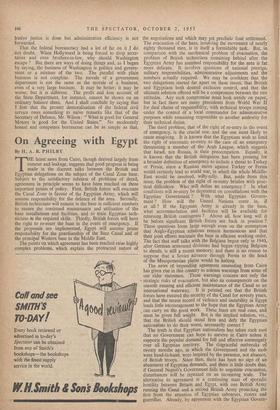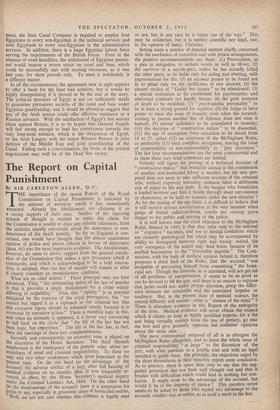On Agreeing with Egypt
By H. A.R. PHILBY The points on which agreement has been reached raise highly complex problems, which explain the protracted nature of the negotiations and which may yet preclude final settlement. The evacuation of the base, involving the movement of nearly eighty thousand men, is in itself a formidable task. But, in comparison with the mechanical problem of evacuation, the problem of British technicians remaining behind after the Egyptian Army has assumed responsibility for the area is far more delicate. It involves questions of national prestige, military responsibilities, administrative adjustments and the numbers actually required. We may be confident that the two delegations started far apart on these issues, that British and Egyptians both desired exclusive control, and that the ultimate solution offered will be a compromise between the two attitudes. Any such compromise must look untidy on paper, but in fact there are many precedents from World War II for dual chains of responsibility, with technical troops coming -under the control of a local commander for administrative purposes while remaining responsible to another authority for their technical duties.
The third problem, that of the right of re-entry in the event of emergency, is the crucial one, and the one most likely to cause misgiving. It is known that the Egyptians wish to limit the right of automatic re-entry to the case of an emergency threatening a member of the Arab League. which suggests that Israel, not Russia, is their preoccupation. Equally, it is known that the British delegation has been pressing for a broader definition of emergency to include a threat to Turkey or Persia, since a Russian move against Turkey or Persia would certainly lead to world war, in which the whole Middle- East would be involved, willy-nilly. But, aside from this issue, the problem of the right of re-entry bristles with prac- tical difficulties. Who will define an emergency ? In what conditions will re-entry be dependent on consultations with the Egyptian Government ? With what Egyptian Govern- ment ? How will the United Nations come in, if at all ? If the Egyptian Army is already in the base, what accommodation and facilities will be available for returning British contingents ? Above all, how long, will it be before significant British forces are back in position ? These questions loom large enough even on the assumption that Anglo-Egyptian relations remain harmonious and that their joint efforts maintain the base in efficient working order. The fact that staff talks with the Belgians began only in 1940, after German armoured divisions had begun ripping Belgium to shreds, is still a recent memory; and there is no reason to suppose that a Soviet advance through Persia to the head of the Mesopotamian plains would be halting. The news of impending agreement emanating from Cairo has given rise in this country to solemn warnings from some of our elder statesmen. These warnings concern not only the strategic risks of evacuation, but also its consequences on the smooth running and efficient maintenance of the Canal as an international waterway. It is pointed out that the British forces have ensured the security of the Canal for seventy years, and that the recent record of violence and instability in Egypt lends little encouragement to the hope that the Egyptian Army can carry on the good work. These fears are real ones, and must be given full weight. But is the implied solution, viz., that the British should stand firm and defy the Egyptian nationalists to do their worst, necessarily correct ?
The truth is that Egyptian nationalism has taken such root that no Government can hope to survive in Cairo unless it supports the popular demand for full and effective sovereignty over all Egyptian territory. The disgraceful outbreaks of twenty months ago, in which the Government and the mob went hand-in-hand, were inspired by the presence, not absence, of British troops. Since then, there has been no sign of an abatement of Egyptian demands, and there is little doubt that, if General Neguib's Government fails to negotiate evacuation, disturbances will be repeated on an increasing scale. The alternative to agreement is a continuing state of sporadic hostility between Britain and Egypt, with one British Army running the Canal and a second British Army protecting the first from the attention of Egyptian saboteurs, rioters and guerrillas. Already, by agreement with the Egyptian Govern- ment, the Suez Canal Company is required to employ four Egyptians to every non-Egyptian in the technical services and nine Egyptians to every non-Egyptian in the administrative services. In addition, there is a large Egyptian labour force serving the requirements of the British forces. Even in the absence of overt hostilities, the withdrawal of Egyptian person- nel would impose a severe strain on canal and base, which could be successfully met with existing resources, as it was last year, for short periods only. To meet it indefinitely is a different matter.
In all the circumstances, the agreement now in sight appears to offer a basis for the least' bad solution; but it would be highly disappointing if it proved to be the end of the story. The political structure of Egypt is not yet sufficiently stable to guarantee permanent security of the canal and base under Egyptian guardianship; and it would be absurd to suggest that any of the Arab armies could offer 'effective resistance to a, Russian advance. With the satisfaction of Egypt's last serious claim against Britain, it is to be hoped that General Neguib will feel strong enough to lead his countrymen towards the only long-term solution, which is the integration of Egypt, or the Arab League, with the major Western Powers in joint defence of the Middle East and joint guardianship of the Canal. Failing such a consummation, the fruits of the present negotiations may well be of the Dead Sea variety.



















































 Previous page
Previous page